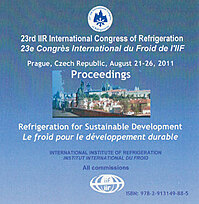
Document IIF
Performance de l'écoulement en ébullition des frigorigènes prenant en compte les inconvénients (pertes d'exergie) pour le transfert de chaleur et la chute de pression.
Flow boiling performance of refrigerants considering penalization terms (exergy losses) for heat transfer and pressure drop.
Numéro : pap. ID: 213
Auteurs : BROWN J. S., ZILIO C.
Résumé
The heat transfer coefficient correlation of Wojtan et al. (2005) and the pressure drop correlation of Moreno Quiben and Thome (2007) are used to analyze the boiling heat transfer performance potentials in plain evaporator tubes of several conventional refrigerants and two newer fluorinated propene isomers possessing low GWP. These correlations are used to calculate two penalization quantities expressed in terms of the refrigerant saturation temperature drop due to pressure drop and the driving temperature difference. These penalization terms are combined into a single Performance Evaluation Criterion dubbed Total Temperature Penalization (TTP). Using the two penalization terms and the TTP, several refrigerants, including R1234yf (CF3CF=CH2) and R1234ze(E) (CF3CH=CHF), are evaluated for their boiling heat transfer performance potentials in plain evaporator tubes, and the usefulness of the technique is illustrated through several examples of the optimization of evaporator tube length.
Documents disponibles
Format PDF
Pages : 8 p.
Disponible
Prix public
20 €
Prix membre*
Gratuit
* meilleur tarif applicable selon le type d'adhésion (voir le détail des avantages des adhésions individuelles et collectives)
Détails
- Titre original : Flow boiling performance of refrigerants considering penalization terms (exergy losses) for heat transfer and pressure drop.
- Identifiant de la fiche : 30002245
- Langues : Anglais
- Source : Proceedings of the 23rd IIR International Congress of Refrigeration: Prague, Czech Republic, August 21-26, 2011. Overarching theme: Refrigeration for Sustainable Development.
- Date d'édition : 21/08/2011
Liens
Voir d'autres communications du même compte rendu (569)
Voir le compte rendu de la conférence
Indexation
-
Experimental investigation of evaporation of pr...
- Auteurs : ALLYMEHR E., EIKEVIK T. M., HAFNER A.
- Date : 24/08/2019
- Langues : Anglais
- Source : Proceedings of the 25th IIR International Congress of Refrigeration: Montréal , Canada, August 24-30, 2019.
- Formats : PDF
Voir la fiche
-
Thermophysical properties, heat transfer and pr...
- Auteurs : CAVALLINI A., BROWN J. S., ZILIO C.
- Date : 29/10/2012
- Langues : Anglais
- Source : ASHRAE/NIST Refrigerants Conference: moving towards sustainability.
- Formats : PDF
Voir la fiche
-
Experimental study on heat transfer and pressur...
- Auteurs : KOYAMA S., BABA D., NAKAHATA H.
- Date : 21/08/2011
- Langues : Anglais
- Source : Proceedings of the 23rd IIR International Congress of Refrigeration: Prague, Czech Republic, August 21-26, 2011. Overarching theme: Refrigeration for Sustainable Development.
- Formats : PDF
Voir la fiche
-
Two-phase flow and boiling of ammonia in horizo...
- Auteurs : THOME J. R., SILVA LIMA R. J. da
- Date : 14/04/2011
- Langues : Anglais
- Source : 4th Conference on Ammonia Refrigeration Technology. Proceedings: Ohrid, North Macedonia, April 14-16, 2011.
- Formats : PDF
Voir la fiche
-
Modeling and analysis of pressure drop oscillat...
- Auteurs : QIAO H., LAUGHMAN C. R.
- Date : 05/2021
- Langues : Anglais
- Source : 2021 Purdue Conferences. 18th International Refrigeration and Air-Conditioning Conference at Purdue.
- Formats : PDF
Voir la fiche
